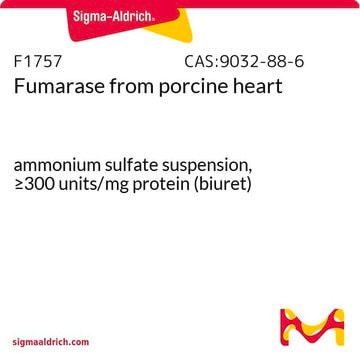F4892
D-Fructose Dehydrogenase from Gluconobacter sp.
≥20 units/mg solid
Sign Into View Organizational & Contract Pricing
All Photos(5)
About This Item
CAS Number:
MDL number:
UNSPSC Code:
12352204
NACRES:
NA.54
Recommended Products
form
amorphous solid
specific activity
≥20 units/mg solid
mol wt
~140 kDa
shipped in
wet ice
storage temp.
−20°C
Application
D-Fructose Dehydrogenase from Gluconobacter sp has been used as a standard in the carbohydrate binding specificity assay and SDS-PAGE (sodium dodecyl sulphate-polyacrylamide gel electrophoresis).
This enzyme is also used in a number of basic research projects to examine the electrochemical properties of enzyme-catalyzed electrode reactions called bioelectrocatalysis.This enzyme is useful for enzymatic determination of D-fructose in clinical analysis.
Biochem/physiol Actions
D-fructose dehydrogenase is a heterotrimeric membrane-bound enzyme commonly seen in various Gluconobacter sp. especially in Gluconobacter japonicus (Gluconobacter industrius). It has a molecular mass of ca. 140 kDa, consisting of subunits I (67kDa), II (51 kDa), and III (20 kDa) and catalyzes the oxidation of D-fructose to produce 5-keto-D-fructose. The enzyme is a flavoprotein-cytochrome c complex with subunits I and II covalently bound to flavin adenine dinucleotide (FAD) and heme C as prosthetic groups, respectively.
Physical properties
Isoelectric point : 5.0 ± 0.1
Michaelis constant : 5 x 10‾3M (D-Fructose)
Inhibitors : Ag+, Hg++, SDS
Optimum pH : 4.0
Optimum temperature : 37°C
pH Stability : pH 4.0 – 6.0 (25°C, 16hr)
Thermal stability : Below 40°C (pH 4.5, 15min)
Michaelis constant : 5 x 10‾3M (D-Fructose)
Inhibitors : Ag+, Hg++, SDS
Optimum pH : 4.0
Optimum temperature : 37°C
pH Stability : pH 4.0 – 6.0 (25°C, 16hr)
Thermal stability : Below 40°C (pH 4.5, 15min)
Unit Definition
One unit will convert 1.0 μmole D-fructose to 5-ketofructose per min at pH 4.5 at 37 °C.
Physical form
This product is supplied as an amorphous solid containing ~ 80% stabilizers, sugars, amino acids and BSA.
Storage Class Code
13 - Non Combustible Solids
WGK
WGK 3
Flash Point(F)
Not applicable
Flash Point(C)
Not applicable
Personal Protective Equipment
dust mask type N95 (US), Eyeshields, Gloves
Choose from one of the most recent versions:
Already Own This Product?
Find documentation for the products that you have recently purchased in the Document Library.
Customers Also Viewed
Rapid identification of sequences for orphan enzymes to power accurate protein annotation
Ramkissoon KR, et al.
PLoS ONE, 8(12), e84508-e84508 (2013)
Kevin R Ramkissoon et al.
PloS one, 8(12), e84508-e84508 (2014-01-05)
The power of genome sequencing depends on the ability to understand what those genes and their proteins products actually do. The automated methods used to assign functions to putative proteins in newly sequenced organisms are limited by the size of
Determination of seminal fructose using D-fructose dehydrogenase.
K Nakashima et al.
Clinica chimica acta; international journal of clinical chemistry, 151(3), 307-310 (1985-10-15)
J Marcinkeviciene et al.
FEBS letters, 318(1), 23-26 (1993-02-22)
Steady-state kinetic analysis was performed on the reaction between D-fructose and ferricyanide with the quinohemoprotein fructose dehydrogenase from Gluconobacter species. The D-fructose oxidation dependence on the ferricyanide concentration resulted in a series of parallel reciprocal plots, and the reaction was
Shukun Yu et al.
Biochimica et biophysica acta, 1760(9), 1314-1322 (2006-07-11)
Anhydrofructose (AF) pathway describes the catabolism of alpha-1,4-glucans of glycogen, starch and maltosaccharides to various metabolites via the central intermediate AF. The reaction sequence of the pathway consists of more than 10 enzymatic steps. This pathway occurs in certain bacteria
Our team of scientists has experience in all areas of research including Life Science, Material Science, Chemical Synthesis, Chromatography, Analytical and many others.
Contact Technical Service


![Poly[(R)-3-hydroxybutyric acid] natural origin](/deepweb/assets/sigmaaldrich/product/structures/129/476/7d1c924b-f644-4889-a2d6-d7a923ce382c/640/7d1c924b-f644-4889-a2d6-d7a923ce382c.png)




